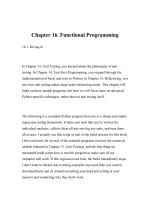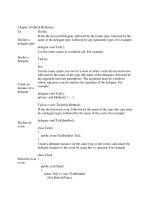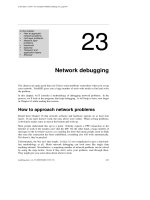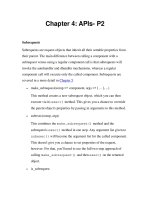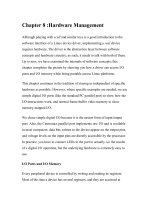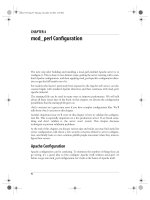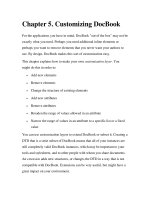Chapter 16: Internetwork Operation docx
Bạn đang xem bản rút gọn của tài liệu. Xem và tải ngay bản đầy đủ của tài liệu tại đây (287.02 KB, 46 trang )
William Stallings
Data and Computer
Communications
Chapter 16
Internetwork Operation
Routing Protocols
Routing Information
About topology and delays in the internet
Routing Algorithm
Used to make routing decisions based on information
Autonomous Systems (AS)
Group of routers
Exchange information
Common routing protocol
Set of routers and networks managed by signle
organization
A connected network
There is at least one route between any pair of
nodes
Interior Router Protocol (IRP)
Passes routing information between routers
within AS
May be more than one AS in internet
Routing algorithms and tables may differ
between different AS
Routers need some info about networks outside
their AS
Used exterior router protocol (ERP)
IRP needs detailed model
ERP supports summary information on
reachability
Application of IRP and ERP
Border Gateway Protocol (BGP)
For use with TCP/IP internets
Preferred EGP of the Internet
Messages sent over TCP connections
Open
Update
Keep alive
Notification
Procedures
Neighbor acquisition
Neighbor reachability
Network reachability
BGP Messages
BGP Procedure
Open TCP connection
Send Open message
Includes proposed hold time
Receiver selects minimum of its hold time and
that sent
Max time between Keep alive and/or update
messages
Message Types
Keep Alive
To tell other routers that this router is still here
Update
Info about single routes through internet
List of routes being withdrawn
Includes path info
Origin (IGP or EGP)
AS_Path (list of AS traversed)
Next_hop (IP address of boarder router)
Multi_Exit_Disc (Info about routers internal to AS)
Local_pref (Inform other routers within AS)
Atomic_Aggregate, Aggregator (Uses address tree structure
to reduce amount of info needed)
Uses of AS_Path and Next_Hop
AS_Path
Enables routing policy
Avoid a particular AS
Security
Performance
Quality
Number of AS crossed
Next_Hop
Only a few routers implement BGP
Responsible for informing outside routers of routes to other
networks in AS
Notification Message
Message header error
Authentication and syntax
Open message error
Syntax and option not recognized
Unacceptable hold time
Update message error
Syntax and validity errors
Hold time expired
Connection is closed
Finite state machine error
Cease
Used to close a connection when there is no error
BGP Routing Information
Exchange
Within AS, router builds topology picture using
IGP
Router issues Update message to other routers
outside AS using BGP
These routers exchange info with other routers
in other AS
Routers must then decide best routes
Open Shortest Path First (1)
OSPF
IGP of Internet
Replaced Routing Information Protocol (RIP)
Uses Link State Routing Algorithm
Each router keeps list of state of local links to
network
Transmits update state info
Little traffic as messages are small and not sent
often
RFC 2328
Route computed on least cost based on user
cost metric
Open Shortest Path First (2)
Topology stored as directed graph
Vertices or nodes
Router
Network
Transit
Stub
Edges
Graph edge
Connect two router
Connect router to network
Sample AS
Directed
Graph of AS
Operation
Dijkstra’s algorithm (Appendix 10A) used to find
least cost path to all other networks
Next hop used in routing packets
Integrates Services
Architecture
Changes in traffic demands require variety of
quality of service
Internet phone, multimedia, multicast
New functionality required in routers
New means of requesting QoS
ISA
RFC 1633
Internet Traffic
Elastic
Can cope with wide changes in delay and/or
throughput
FTP sensitive to throughput
E-Mail insensitive to delay
Network Management sensitive to delay in times of heavy
congestion
Web sensitive to delay
Inelastic
Does not easily adapt to variations
e.g. real time traffic
Requirements for Inelastic
Traffic
Throughput
Delay
Jitter
Delay variation
Packet loss
Require preferential treatment for certain types
of traffic
Require elastic traffic to be supported as well
ISA Approach
Congestion controlled by
Routing algorithms
Packet discard
Associate each packet with a flow
Unidirectional
Can be multicast
Admission Control
Routing Algorithm
Queuing discipline
Discard policy
ISA Components
Token Bucket Traffic
Specification
Token replenishment rate
R
Continually sustainable data rate
Bucket size
B
Amount that data rate can exceed R for short period
During time period
T
amount of data sent can not
exceed
RT + B
Token Bucket Scheme
ISA Services
Guaranteed
Assured data rate
Upper bound on queuing delay
No queuing loss
Real time playback
Controlled load
Approximates behavior to best efforts on unloaded
network
No specific upper bound on queuing delay
Very high delivery success
Best Effort
